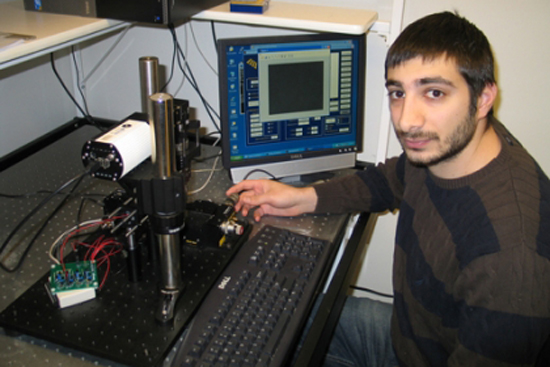ENG Student’s Award-Winning Technology
$150,000 prize will help develop point-of-care multi-pathogen test

George Daaboul, a PhD student in biomedical engineering (BME) who designed a fast and easy-to-use microfluidic device to test for a number of diseases in the field, is the winner of the 2011 CIMIT Student Prize for Primary Healthcare, which comes with $150,000 in seed funding. The national competition, open to graduate and undergraduate students from accredited engineering programs, awards prizes annually for technologic innovations that offer the potential to improve the delivery of health care.
Daaboul’s award-winning technology, which he began developing as part of his top-ranked BME senior design project in 2009, could enable physicians to quickly pinpoint viral infections and reduce unnecessary antiviral and antibiotic usage.
“The prize money will allow me to apply the technology where I believe it will have the most impact on health care delivery,” said Daaboul (ENG’11, ’16). “My initial goal will be to establish a universal detection platform for infectious disease diagnostics, and demonstrate it with influenza and other viruses.”
Daaboul edged out nine other finalists from Yale; MIT; Johns Hopkins; Texas A&M; the University of California, Berkeley; Kansas State University; and Northeastern University.
“We are delighted with the quality of the entries this prize competition has elicited each year amongst engineering students,” said Ronald Newbower, director of the competition and cofounder of the Center for Integration of Medicine and Innovative Technology (CIMIT), a consortium of Boston-area teaching hospitals and universities. “The winners of our major awards are headed toward truly significant careers and may well serve as role models for others in their field.”
To develop the diagnostic platform, known as the interferometric reflectance imaging sensor (IRIS), Daaboul is advancing sensor and microfluidics technology in collaboration with his advisor, Selim Ünlü, an ENG professor of Electrical & Computer Engineering, and a team of multidisciplinary researchers. The team is advancing a new method that enables detection of single viral particles with far more sensitivity and specificity than existing detection methods, a method that could enable clinicians to isolate individual virus particles of interest.
“George’s work is a stellar example of innovative and multidisciplinary thinking in a broad collaboration with medical and international researchers,” said Ünlü. “His research will have a significant impact in viral diagnostics by advancing the technology beyond the state-of-the-art while making it inexpensive and widely accessible.”
This year’s CIMIT contest fielded applications for the Primary Healthcare prize from 33 engineering programs nationally.
Mark Dwortzan can be reached at dwortzan@bu.edu.
Comments & Discussion
Boston University moderates comments to facilitate an informed, substantive, civil conversation. Abusive, profane, self-promotional, misleading, incoherent or off-topic comments will be rejected. Moderators are staffed during regular business hours (EST) and can only accept comments written in English. Statistics or facts must include a citation or a link to the citation.